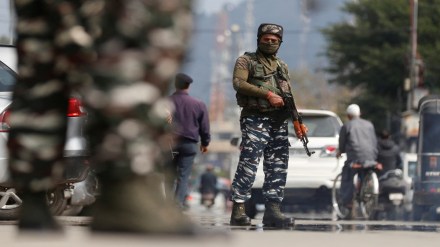The surge in terror activities in Jammu and Kashmir (J&K) has become a matter of grave concern, particularly following the death of an Indian Army officer, Capt. Deepak Singh, during an encounter in Doda district. The incident underscores the increasing frequency of terror attacks in the region, raising alarm over the security situation.
On the eve of Independence Day, security forces neutralized a terrorist in Doda after an intense gunfight. The encounter, which began in the dense forests of the Assar area, saw the unfortunate demise of Capt Deepak Singh, who was leading a search operation. His sacrifice adds to the growing list of casualties among security personnel in the region, which has witnessed a sharp rise in terror-related incidents in recent months.
Capt. Deepak Singh was part of the 48 Rashtriya Rifles, a unit known for its counter-insurgency operations in J&K. The operation, launched jointly by the Indian Army and J&K Police, aimed to flush out terrorists hiding in the area. The encounter resulted in the recovery of an AK-47 and an M4 rifle, indicating the presence of heavily armed militants.
This operation comes at a time when Jammu has seen a significant increase in terror attacks. Just a few days prior, a gunfight in Anantnag claimed the lives of two soldiers and a civilian. Such incidents are becoming alarmingly frequent, with multiple attacks on army convoys and skirmishes in districts like Kathua, Udhampur, and Doda. The situation has prompted heightened security measures across the region, especially with the upcoming Independence Day celebrations.
The rise in terror activities has not gone unnoticed by the central government. Defence Minister Rajnath Singh convened a high-level meeting to address the growing threat. The meeting, attended by key officials including National Security Advisor Ajit Doval and Army Chief General Upendra Dwivedi, focused on devising strategies to counter the escalating violence.
The Ministry of Home Affairs (MHA) reported to the Lok Sabha that 28 people, including civilians and security personnel, have been killed in 11 terror-related incidents this year alone, up to July 21. This sharp rise in violence underscores the challenges faced by security forces in maintaining peace and stability in the region.
The recent encounter in Doda is part of a larger pattern of increasing terror activities in Jammu and Kashmir. The terrorists involved are often well-trained and equipped, with reports indicating that Pakistan-based groups like Jaish-e-Mohammad (JeM) have been pushing militants into the region. The Pir Panjal range, which stretches from Poonch to Doda, has become a critical route for terrorists attempting to infiltrate into Kashmir from the Jammu side.
The death of Capt Deepak Singh is a stark reminder of the sacrifices made by security personnel in their relentless fight against terrorism.
As security forces continue their operations to neutralize the remaining terrorists, the situation remains tense. The government has deployed additional troops to the Jammu region, tightening the security grid in an effort to prevent further attacks. However, the rising frequency of these incidents indicates that the challenge of terrorism in Jammu and Kashmir is far from over.
The need for a comprehensive strategy to address the root causes of terrorism and enhance security measures is more urgent than ever.
